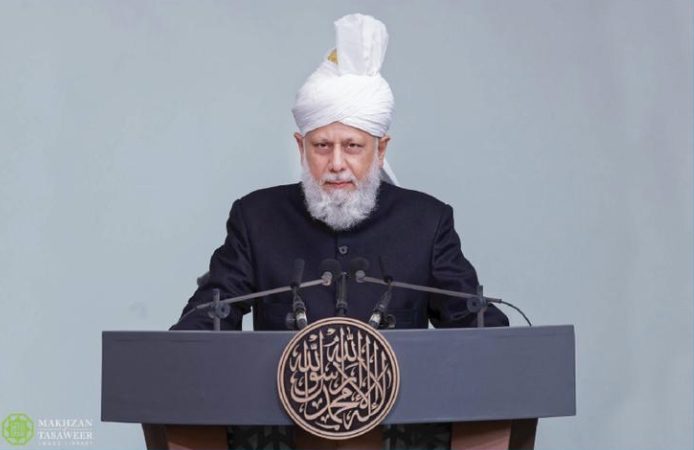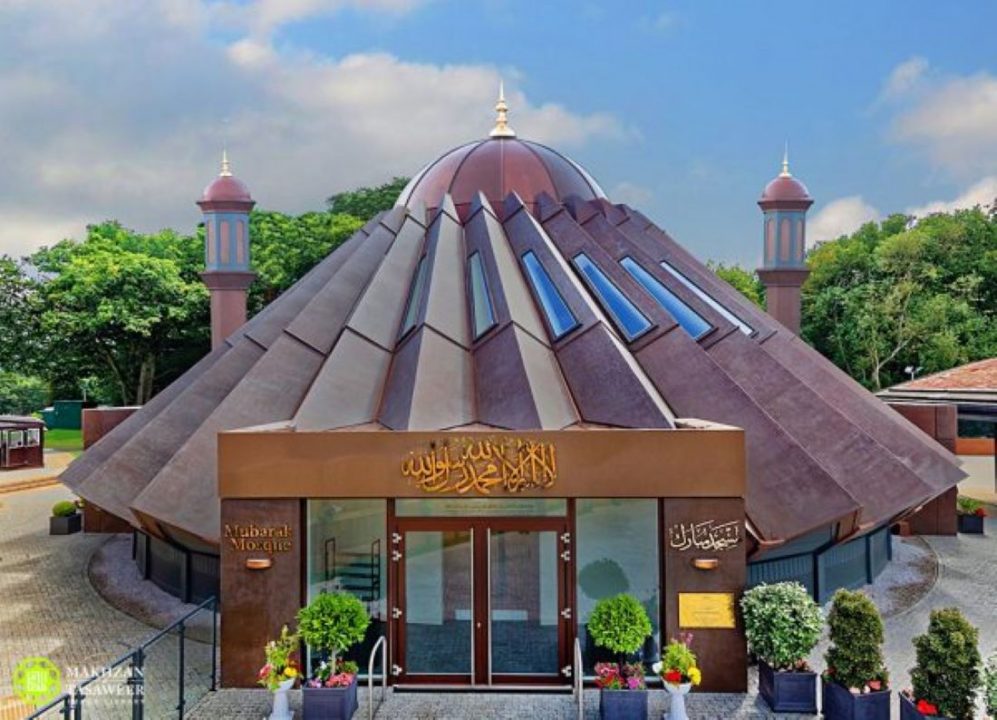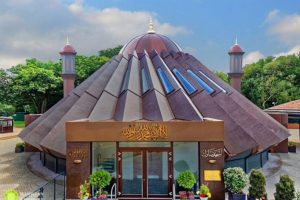After reciting Tashahhud, Ta`awwuz and Surah al-Fatihah, His Holiness, Hazrat Mirza Masroor Ahmad (aba) said that he would continue mentioning battles and expeditions from the life of the Holy Prophet (sa), speaking today about the Battle of Hunain.

The Battle of Hunain
His Holiness (aba) said that this battle took place in Shawwal 8 AH. It is called the Battle of Hunain because this battle took place in a town called Hunain located 26 km from Makkah. This battle is also called the Battle of Hawazin, as the Hawazin Tribe took part in large numbers. It is also called the Battle of Utas, as during the battle, many from the enemy side fled to a place called Utas, where the Muslims followed and defeated them. Some historians have mentioned Utas as part of a seperate expedition.
His Holiness (aba) said that the Battle of Hunain has been mentioned in the Holy Qur’an as follows:
‘Surely, Allah had helped you on many a battlefield, and on the Day of Hunain, when your great numbers made you proud, but they availed you nought; and the earth, with all its vastness, became straitened for you, and then you turned your backs retreating. Then Allah sent down His peace upon His Messenger and upon the believers, and He sent down hosts which you did not see, and He punished those who disbelieved. And this is the reward of the disbelievers. Then will Allah, after that, turn with compassion to whomsoever He pleases; and Allah is Most Forgiving, Merciful.’ (The Holy Qur’an, 9:25-27)
Background of the Battle of Hunain
His Holiness (aba) said that the background of the battle was that after the Conquest of Makkah, majority of the Arabian tribes had either accepted Islam or had accepted the leadership of the Holy Prophet (sa). However, the Banu Hawazin and the Banu Thaqif who were both tribes given to fighting not only refused to obey the Holy Prophet (sa), but their chieftains gathered together and thought that the Holy Prophet (sa) might attack them, and so they should launch an attack first. Soldiers from other tribes also joined alongside the Banu Hawazin. In fact, narrations indicate that the Banu Hawazin had started preparing for a battle against the Holy Prophet (sa) long before, since they had started seeing the Holy Prophet (sa) gaining power and gradually eradicating idol worship.
His Holiness (aba) said that the Holy Prophet (sa) came to know of these preparations by the Banu Hawazin when, prior to the Conquest of Makkah, the Holy Prophet (sa) sent a contingent ahead who happened to capture a man from the Banu Hawazin who served as a spy. When the Holy Prophet (sa) questioned him, he said that the Banu Hawazin had gathered a large army comprising soldiers from other tribes, and had sent a caravan to Jordan in order to gather heavy armoury in preparation for a battle against the Holy prophet (sa). It was in the midst of these preparations that the Conquest of Makkah took place, which struck the indignation of the Banu Hawazin even further, who decided to set out to fight the Holy Prophet (sa). The army consisted of 20,000 soldiers, and was led by Malik bin Auf, who was only 30 years of age at the time. This army then marched towards Hunain. Malik bin Auf instructed something unprecedented to his army, telling them that they must not set out alone, but bring along with them their wives and children, as well as their wealth and livestock. The purpose for this was so that every soldier fought with great zeal, knowing there was nowhere to run because if they did then their wives and children, wealth and livestock would be in danger.
His Holiness (aba) said that Duraid bin Simma, a more than 100-year old blind chieftain of the Banu Jushm tribe tried to persuade against this battle. He was well experienced in battle and in his day was known for his great bravery in battle. When he learned that wives and children, wealth and livestock had been brought along, Duraid questioned Malik bin Auf about this decision. Duraid said that this was not a good strategy. He advised to send the women and children away to a fortress, however Malik refused. Duraid advised the people that fighting in such a manner was not wise and advised against the battle. However Malik bin Auf vehemently declared that everyone must obey him, and if they did not then he would strike himself with his own sword. The Banu Hawazin consulted one another and decided that they had no choice but to obey Malik bin Auf. Duraid then advised that Malik should have his soldiers hide in the valleys so that they would be able to wage a surprise attack if the Muslim army advanced. Malik agreed with this suggestion.
The Holy Prophet’s (sa) Preparations for Battle
His Holiness (aba) said that the Holy Prophet (sa) received word of the Hawazin’s preparations. He sent Hazrat Abdullah bin Abu Hadrad Aslami (ra) to find out more. He went to the Banu Hawazin and gathered information and even heard Malik saying that the Holy Prophet (sa) had never before fought a people such as the Hawazin and that they should all wage a singular and fierce attack, reminding that the ultimate victor would be the one to strike first. Hearing this, the Holy Prophet (sa) had no choice but to make preparations.
His Holiness (aba) said that before departing from Makkah, the Holy Prophet (sa) analysed and saw that the Muslims did not have sufficient armoury for the level of battle that was expected. The Holy Prophet (sa) asked Safwan bin Umayyah to loan his weaponry which would later be returned to him. He provided chainmail, weaponry and even camels. After the battle when the armoury was being collected to be returned to Safwan, it was noticed that there were a few short of the number originally given by Safwan. The Holy Prophet (sa) told Safwan that he would instead pay the amount for the missing armour. However, in that time, Safwan had completely changed and accepted Islam, and refused to take any amount from the Holy Prophet (sa). It is astonishing that the Holy Prophet (sa), the Victor of Makkah who had control now over all the wealth, still took loans for the sake of the battle from various people, with the guarantee of repaying the amounts in full.
His Holiness said that he would continue mentioning these details in the future.

Funeral Prayers
His Holiness (aba) said that he would offer two funeral prayers in absentia of the following:
Khawaja Mukhtar Ahmad Butt son of Khawaja Abdur Rahman of Sialkot, Pakistan. He was a lawyer who then joined the Air Force, however he was later let go on account of being an Ahmadi. During the sensitive period of 1974, upon the instruction of the Third Caliph (rh), he served as part of the Community’s legal commission and rendered various services. He had a close connection with Hazrat Mirza Bashir Ahmad (ra) and Hazrat Chaudhary Zafrulla Khan (ra). He helped in the preparation of the first volume of the book Essence of Islam. He served in the Community’s Board of Jursiprudence (Qadha) in Rabwah. His Holiness (aba) said that he also worked with him in this department for some time and found him to be very wise and humble. He had a deep connection with Khilafat and remained closely attacked to His Holiness (aba) as well. He moved to Canada in 2002 where he served as Regional President. He was a sincere and loyal Ahmadi whose life was characterised by loyalty to Khilafat, humility and sincerity. He is survived by his wife, a daughter and two sons. He instilled in his children the spirit of always remaining attached to Khilafat. He was always devoted to worship, and would offer finanlical contributions at the beginning of the month. His entire family, including his wife and her family have all rendered great services. His Holiness (aba) prayed that may his children carry on the legacy of his virtues. May Allah grant forgiveness and mercy to the deceased.
Sayyida Begum wife of Nazir Ahmad of India. She is survived by her husband, three daughters and four sons. She was the mother of Tahir Ahmad Tariq, Naib Nazir Islah-o-Irshad Qadian. Tahir Ahmad Tariq was in the UK as an official representative at the time of his mother’s passing and was unable to attend her funeral. The entire family is devoted to the service of the Community. His Holiness (aba) prayed that may Allah grant her forgiveness and mercy. She endured health complications for 25 years, which she bore with great patience and never complained. She was pure hearted, and treated all of her relatives well. She had great love for Khilafat. She always promoted spiritual and secular education for her children. His Holiness (aba) prayed that may Allah grant her forgiveness and mercy.
Summary prepared by The Review of Religions




Add Comment